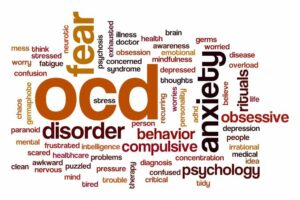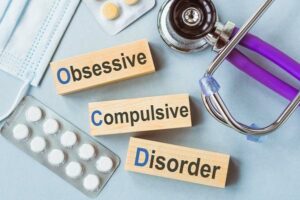The fifth edition of the Diagnostic and Statistical Manual of Mental Disorders (DSM-5) was released in 2013, and it included a new diagnosis for Obsessive-Compulsive Disorder (OCD). If you are wondering how to diagnose OCD, then keep reading. In this blog post, we will discuss the DSM-5 criteria for OCD. We will also provide tips on how to get help if you think you may be suffering from OCD.
Contents
What Is OCD?
 OCD is described as an anxiety disorder that is characterized by obsessions and compulsions. Obsessions are defined as intrusive and unwanted thoughts, images, or urges that trigger anxiety. Compulsions are repetitive behaviors or mental acts that a person feels compelled to do in order to relieve the anxiety caused by the obsessions.
OCD is described as an anxiety disorder that is characterized by obsessions and compulsions. Obsessions are defined as intrusive and unwanted thoughts, images, or urges that trigger anxiety. Compulsions are repetitive behaviors or mental acts that a person feels compelled to do in order to relieve the anxiety caused by the obsessions.
There are four main types of OCD: checking, contamination, hoarding, and symmetry. Each type is characterized by different obsessions and compulsions. It is believed that OCD develops as a result of a combination of genetic and environmental factors.
Moreover, OCD can be divided into two subtypes: primary and secondary. Primary OCD is diagnosed when a person experiences obsessions and compulsions that are not attributed to another psychiatric disorder, medical condition, or substance abuse. Secondary OCD is diagnosed when a person’s obsessions and compulsions are attributable to another psychiatric disorder, medical condition, or substance abuse.
The condition is typically diagnosed in adolescence or young adulthood but can develop at any age. The average age of onset is 19 years old. OCD affects men and women equally. If you are experiencing symptoms of OCD, it is important to seek professional help. A trained mental health professional can help you understand your symptoms and develop a treatment plan.
What Is DSM-5?
DSM is an acronym for the Diagnostic and Statistical Manual of Mental Disorders, Fifth Edition. The DSM-V is published by the American Psychiatric Association (APA) and provides a common language and standard criteria for the classification of mental disorders. It is believed that having a common language and standard criteria will improve communication among mental health professionals and help to ensure that people with mental disorders receive appropriate treatment.
The DSM-V is used by clinicians, researchers, pharmaceutical companies, insurance companies, and policymakers. It is the most widely used diagnostic tool for mental disorders in the world. This DSM 5 is basically a manual that is used to diagnose psychiatric disorders.
It contains all the mental disorders and their symptoms. So, a mental health professional can use this manual to diagnose a patient with OCD if the patient is exhibiting certain symptoms.
What Are The OCD DSM 5 Criteria?
 OCD DSM-5 criteria are believed to be one of the most accurate ways to diagnose OCD. The main reason for this is that it takes into account both the symptoms and severity of OCD.
OCD DSM-5 criteria are believed to be one of the most accurate ways to diagnose OCD. The main reason for this is that it takes into account both the symptoms and severity of OCD.
There are a total of nine DSM-V criteria for OCD, but only six need to be met for a diagnosis. The first three criteria deal with obsessions, while the last three criteria deal with compulsions. Let’s discuss all six of the criteria in detail.
Top Six Criteria
The first criterion is having obsessions that cause distress or are time-consuming. Obsessions are defined as intrusive and unwanted thoughts, impulses, or images that are persistent and cause anxiety or distress. To meet this criterion, the obsessions must also be time-consuming, meaning they take up at least one hour per day.
The second criterion is that the individual must attempt to suppress or neutralize their obsessions with some other thought or action. This can be done in a number of ways, such as by repeatedly telling oneself that the thoughts are not real, by avoiding situations that trigger the obsessions, or by excessive cleaning and handwashing.
The third criterion is that the obsessions cause significant distress or impairment in social, occupational, or other important areas of functioning. This means that the individual’s quality of life is significantly impacted by their OCD symptoms.
The fourth criterion is that compulsions are performed in an attempt to alleviate the anxiety or distress caused by the obsessions. Compulsions are defined as repetitive behaviors or mental acts that the individual feels compelled to do in order to reduce their anxiety.
The fifth criterion is that the compulsions are time-consuming, meaning they take up at least one hour per day. This further impacts the individual’s quality of life and ability to function in other areas.
Finally, in the sixth criterion, the compulsions or obsessions must not be due to the physiological effects of a substance or another medical condition. This is important in ruling out other potential causes for the symptoms.
If you believe you or someone you know meets all six of these criteria, it is important to seek professional help. A qualified mental health professional will be able to properly diagnose and treat OCD.
Who Can Diagnose OCD From DSM-5 Criteria?
 OCD DSM-5 criteria are something that can be diagnosed by a medical professional. This means that if you think you may have OCD, you should see your doctor or mental health professional. They will ask you questions about your symptoms and how they impact your life.
OCD DSM-5 criteria are something that can be diagnosed by a medical professional. This means that if you think you may have OCD, you should see your doctor or mental health professional. They will ask you questions about your symptoms and how they impact your life.
There are several types of professionals that can diagnose OCD from DSM-V criteria. These include:
Psychiatrists
A psychiatrist is a medical doctor who has specialized in mental health. They can prescribe medication and provide talk therapy. They hold a degree in medicine and have completed residency training in psychiatry. It is also believed that a psychiatrist is the best type of doctor to see for OCD in order to get the right treatment plan.
Psychologists
A psychologist is a mental health professional with a Ph.D. or PsyD degree in psychology. They provide talk therapy but cannot prescribe medication. To become a psychologist, they must have completed an internship and at least one year of postdoctoral supervised experience. In this way, they can provide a diagnosis of OCD from DSM-V criteria.
Licensed Clinical Social Workers
Clinical social workers are mental health professionals who can provide you with a diagnosis of OCD if you present with the symptoms. To make a diagnosis, your social worker will ask you about your thoughts, behaviors, and emotions. They will also want to know how these symptoms are impacting your life. The diagnosis of OCD DSM 5 criteria is made when you have symptoms that are impacting your life in a negative way. And you have tried to manage them on your own but have been unsuccessful.
Licensed professional counselors
Counselors are generally not authorized to make a formal diagnosis, but they can provide support and guidance. A counselor may also be able to provide referrals to other mental health professionals who are qualified to make a diagnosis. In fact, they have also read the DSM-V and are familiar with the symptoms of OCD. So, a licensed professional counselor can be a great resource if you think you or a loved one may have OCD.
If you or someone you know is struggling with OCD, there are many resources available to help. You just need to reach out and ask for help. Remember, you are not alone. There are many people who understand what you are going through and want to help. You can find more information about OCD and available resources online. So get started today and find the help you need.
How It Can Be Treated?
 If you are diagnosed with OCD, there are many effective treatments available. Some of the common treatment options are listed below:
If you are diagnosed with OCD, there are many effective treatments available. Some of the common treatment options are listed below:
Cognitive behavioral therapy (CBT)
CBT is a type of psychotherapy that helps people change their thinking and behavior. It has been found to be very effective in treating OCD. This therapy option is usually provided by a trained therapist. CBT works to help people with OCD to understand their thoughts and feelings and to learn how to change their behavior. The main goal is to help people with OCD to manage their symptoms and to live a normal life.
Exposure and response prevention (ERP)
ERP is basically one line of defense against OCD. It involves exposing yourself to your fears and anxiety-provoking situations and learning how to cope with the anxiety without engaging in your compulsions or avoidance behaviors. For example, it can involve, with the help of a therapist, touching something you fear is contaminated and allowing yourself to experience the anxiety without washing your hands.
Medication
There are several types of medication that can be used to treat OCD. The most common type of medication is serotonin reuptake inhibitors (SSRIs). SSRIs work by increasing levels of serotonin in the brain. This helps to reduce OCD symptoms. Other types of medication that can be used to treat OCD include tricyclic antidepressants and antipsychotics. It is important to talk to your doctor about the risks and benefits of each type of medication before starting any treatment.
Self-help and support groups
 There are many self-help books and websites that can provide information and support for people with OCD. There are also support groups available in many cities. These groups provide a place for people with OCD to share their experiences and provide support for one another. You should also choose a healthy lifestyle that helps to support your mental health. This can include regular exercise, eating a healthy diet, and getting enough sleep.
There are many self-help books and websites that can provide information and support for people with OCD. There are also support groups available in many cities. These groups provide a place for people with OCD to share their experiences and provide support for one another. You should also choose a healthy lifestyle that helps to support your mental health. This can include regular exercise, eating a healthy diet, and getting enough sleep.
OCD can be a debilitating disorder, but there are many effective treatments available. With the help of a trained therapist, medication, and/or self-help and support groups, people with OCD can learn to manage their symptoms and live a normal life. And with OCD DSM-5 criteria, the diagnosis can be done properly. So, further, choose a healthy lifestyle that helps to support your mental health and talk to your doctor about the best treatment options for you.
Conclusion
To conclude, OCD DSM-5 criteria are important in making an accurate diagnosis of OCD. It is important to keep in mind that the symptoms must be present for at least six months and cause significant distress or impairment in order to make a diagnosis. If you think you may have OCD, it is important to seek professional help. A mental health professional can help you understand your symptoms and develop a treatment plan.
Therefore, you should not feel discouraged if you do not meet all the criteria for a diagnosis of OCD. It is still possible to seek treatment and find relief from your symptoms. If you have any questions or concerns, please feel free to reach out to Therapy Mantra. The team of experts at Therapy Mantra is here to help you through every step of your journey to recovery.
OCD can be a debilitating disorder, but with the right treatment, you can live a full and happy life. And we understand how hard it can be to seek help, but we assure you that it is worth it. So please do not hesitate to reach out to us. So, don’t delay and get the help that you need today! You can book a free therapy or download our free OCD treatment app on Android or iOS.


